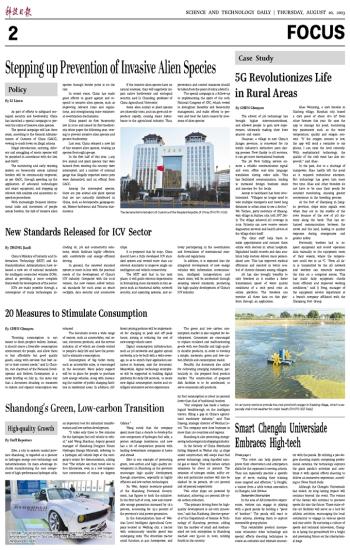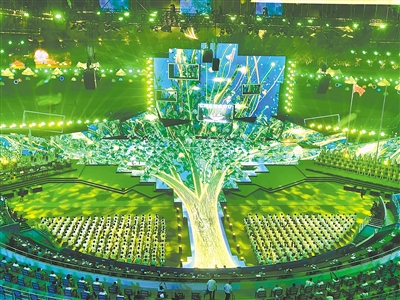
 |
| The autostereoscopic 3D display of the Chinese dove tree during the closing ceremony of the 31st FISU Summer World University Games in Chengdu, southwest China's Sichuan province. (PHOTO: CHEN Ke/S&T Daily) |
Pandas, Sichuan spicy cuisine and tea houses are traditional images that come to mind when people think of Chengdu, the capital city of Sichuan province. However, the recently concluded Chengdu FISU World University Games have transformed these stereotypical impressions of the city, and showcased its scientific and technological strength and innovative vitality.
High-tech opening ceremony
The opening ceremony of the games presented a fusion of high -tech and artistic splendor. Held at Dong'an Lake Sports Park Stadium, the ceremony featured a seamless integration of technological innovation with Chengdu's cultural heritage. This was exemplified by vibrant silk threads and Shu embroidery patterns, symbolizing the city's rich culture, projected onto the stadium's track during the athletes' parade.
The production team developed a system incorporating 40 lasers to create the visual effects, according to Wang Ruixiang, general producer of the opening ceremony. Additionally, the team engineered an intelligent control device for aerial stunts. This device, tailored to the stadium's architectural features, helped produce the ideal artistic effects and represented the vigor and vitality of university students, according to People's Daily Online.
To minimize environmental impact, the opening ceremony used high-tech environmental protection fireworks. The firework agents were free of heavy metals and used a low sulfur content to greatly reduced the sulfur generated during discharge, Chen Weiya, chief director of the opening ceremony, told Science and Technology Daily.
Introducing robots to the Universiade
Ranging from coffee making to table tennis coaching, the Chengdu Universiade showcased the integration of robotics in various critical roles.
One of the most remarkable robots featured at the event was a panda-like robot, designed to resemble the event mascot "Rongbao." This groundbreaking service robot was equipped to handle emergencies and distribute emergency kits, cardiac defibrillators, and other medical tools. Additionally, it offered various services such as providing explanations, answering inquiries, translating and guiding attendees.
Another noteworthy robot appearing at the Universiade was the "training partner robot," capable of mimicking human movements in table tennis, such as speed, rotation, and the landing point for each ball served.
"The robot can help players improve their observation and anticipation skills for the opponent's serving actions. They can repeatedly practice a specific type of serve, making their training more targeted and effective," Li Pengfei, a trainer from a table tennis association in Chengdu, told Xinhua.
Immersive Interaction
In the area of AR interactive experiences, visitors can engage in playing with a giant panda by holding a "piece of bamboo." The panda will react to their actions, allowing them to capture memorable group photos.
This remarkable product incorporates volumetric video technology and special effects shooting techniques to create an authentic and intimate encounter with the panda. By utilizing a 360-degree shooting matrix comprising professional cameras, the technology captures the giant panda's activities and combines it with special effects shooting to deliver an immersive experience, according to China Youth Daily.
Although the Chengdu Universiade has ended, its long-lasting impact will continue beyond the event. The venues of the Games will continue to promote sports far into the future. These state-of-the-art facilities will serve as a hub for athletic activities, encouraging the local community to engage in various sports and stay active. By nurturing a culture of sports and technical innovation, Chengdu is laying the groundwork for a bright and promising future on the international stage.


 Next
Next




